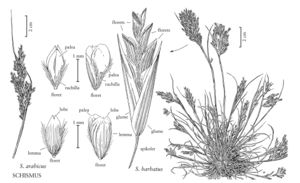Difference between revisions of "Schismus barbatus"
imported>Volume Importer |
imported>Volume Importer |
||
| Line 43: | Line 43: | ||
|publication year= | |publication year= | ||
|special status=Introduced | |special status=Introduced | ||
| − | |source xml=https:// | + | |source xml=https://bitbucket.org/aafc-mbb/fna-data-curation/src/2e0870ddd59836b60bcf96646a41e87ea5a5943a/coarse_grained_fna_xml/V25/V25_971.xml |
|subfamily=Poaceae subfam. Danthonioideae | |subfamily=Poaceae subfam. Danthonioideae | ||
|tribe=Poaceae tribe Danthonieae | |tribe=Poaceae tribe Danthonieae | ||
Revision as of 21:06, 5 November 2020
Plants annual. Culms 6-27 cm. Ligules 0.3-1.1 mm, of hairs; blades 3-15 cm long, 0.3-1.5 mm wide, abaxial surfaces glabrous or scabrous, adaxial surfaces scabrous, sparsely long-pubescent near the ligules. Panicles 1-6(7.5) cm. Spikelets 4.5-7 mm. Lower glumes 4-5.2 mm, exceeded by the distal florets; upper glumes 4-5.3 mm; lemmas 1.5-2(2.5) mm, with sparse, appressed pubescence between the veins, or glabrous and with spreading hairs on the margins, lobes as wide as or wider than long, acute to obtuse; paleas 1.7-2.2(2.6) mm, those of the lower florets in the spikelets as long as or longer than the lemmas; anthers 0.2-0.4 mm. Caryopses 0.6-0.8 mm. 2n = 12.
Distribution
N.Mex., Tex., Utah, Calif., Ariz., Nev.
Discussion
Schismus barbatus is native to Eurasia, but it is now established in the southwestern United States. It grows in sandy, disturbed sites along roadsides and fields and in dry riverbeds.
Selected References
None.
